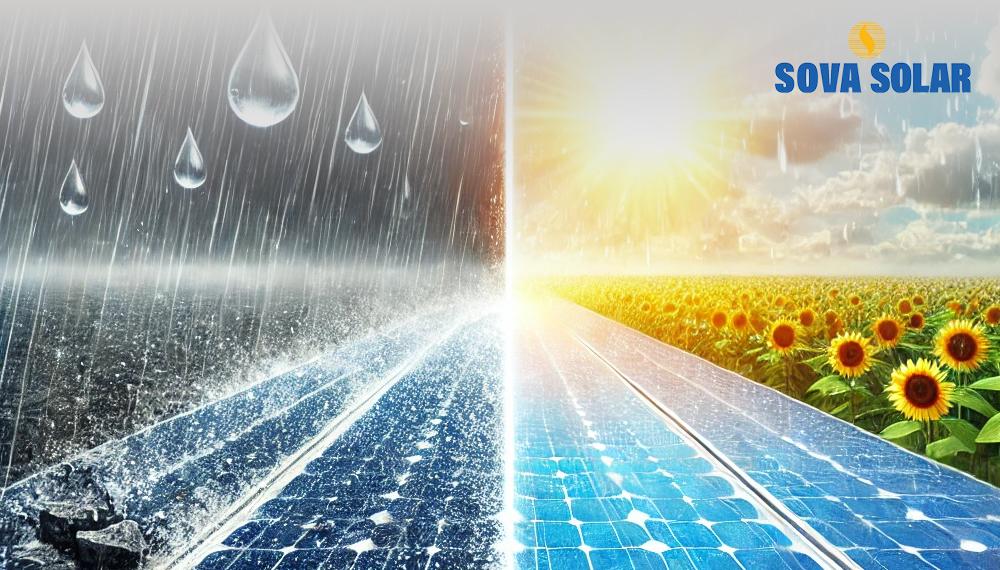
- sovasolar_admin
- Mar 28, 2025
- Uncategorized
- 0 Comments
Solar energy has emerged as one of the most reliable and sustainable renewable energy sources. With rising electricity costs and a growing emphasis on environmental conservation, businesses and homeowners are increasingly turning to solar power to meet their energy needs. However, while solar panels offer numerous advantages, their efficiency can be influenced by changing weather conditions. Understanding how different environmental factors affect solar energy production is essential for optimizing performance and ensuring long-term durability.
For this reason, choosing a trusted solar panel manufacturer in Kolkata, like Sova Solar, is crucial to ensuring that your panels are built to withstand diverse climatic conditions. In this blog, we will explore the impact of various weather conditions on solar panels and how you can maximize efficiency in any environment.
1. Sunlight: The Ideal Condition for Solar Panels
As expected, solar panels perform best under clear skies with direct sunlight. Maximum energy generation occurs when the sun is shining brightly, and the panels are positioned to absorb the most sunlight. The efficiency of a solar panel depends on factors such as its angle, location, and the duration of sunlight exposure throughout the day. In regions with high solar irradiance, panels operate at peak efficiency, producing the maximum possible energy output.
For businesses looking to invest in renewable energy, partnering with a reputable solar panel manufacturer company in Kolkata ensures access to high-performance panels designed for maximum energy conversion.
2. Cloudy Days: Do Solar Panels Work?
Many people assume that solar panels become ineffective on cloudy days, but this is a misconception. While overcast conditions do reduce energy production, solar panels can still generate electricity. Any obstruction between the panels and the sun—whether it’s clouds, fog, or shade—affects output. However, much like how you can still get sunburned on a cloudy day, solar panels continue to produce power, depending on the density of cloud cover.
On partly cloudy days, energy production may drop by 10% to 25%, depending on how frequently clouds pass over the panels. Advanced technology in high-quality solar panels, such as those produced by solar power companies in Kolkata, helps maintain efficiency even in fluctuating weather conditions.
3. Rain: A Natural Panel Cleaner
Rain may seem like a drawback for solar panels, but it actually helps maintain their efficiency. Over time, dust, dirt, and debris accumulate on the panel surface, hindering sunlight absorption. Rain naturally washes away these impurities, ensuring the panels remain clear and function at peak performance. Additionally, rainwater helps cool the panels, preventing overheating and supporting optimal energy production.
However, frequent and prolonged rainfall can reduce overall sunlight exposure, temporarily lowering energy generation. High-quality panels from leading solar panel manufacturers in Kolkata are designed to withstand heavy rains while maintaining efficiency.
4. Snow: A Double-Edged Sword
Snowfall presents a unique challenge for solar panel efficiency. A light layer of snow has minimal impact, as some sunlight can still penetrate or reflect off the surface. However, unlike rain, snow can accumulate on the panels and obstruct direct sunlight, reducing energy production.
Fortunately, well-designed solar panels installed at an optimal tilt can help snow slide off quickly. Additionally, the panels’ dark surface absorbs heat, causing snow to melt faster. If you live in a region prone to snowfall, choosing a solar panel manufacturer company in Kolkata that offers durable and weather-resistant panels is essential.
5. Wind: A Factor in Durability
Wind itself does not directly impact solar energy production, but it can affect the structural integrity of solar installations. Strong winds can damage poorly mounted panels, making it crucial to ensure that mounting systems are securely installed and designed to withstand extreme weather conditions.
On the positive side, wind helps cool down solar panels, which can enhance efficiency by preventing overheating. By working with solar power companies in Kolkata, you can ensure your panels are securely installed to withstand high winds and severe weather conditions.
6. Temperature: The Hidden Impact on Efficiency
Many people assume that solar panels work best in extreme heat, but high temperatures can actually reduce efficiency. Most solar panels operate optimally at around 25°C (77°F). When temperatures rise above this threshold, the energy output decreases due to increased electrical resistance.
To prevent overheating, proper ventilation and adequate spacing between panels are crucial. High-quality panels from trusted solar panel manufacturers in Kolkata are designed with advanced materials that minimize heat absorption, ensuring consistent performance even in hot climates.
7. Seasonal Variations: Summer vs. Winter Performance
Solar panels typically produce more electricity in summer due to longer daylight hours, although high temperatures may slightly reduce efficiency. In winter, shorter days result in reduced sunlight exposure, but cooler temperatures can improve panel performance by reducing electrical resistance.
Understanding these seasonal variations allows homeowners and businesses to plan their energy usage accordingly and store excess energy when possible. Investing in energy storage solutions, such as solar batteries, can help maintain a steady power supply throughout the year.
8. Extreme Weather Events: Preparing for the Unexpected
Hurricanes, hailstorms, and heavy storms can pose risks to solar panels. Most modern panels are built to withstand extreme weather conditions, but it is always advisable to check their durability ratings before installation.
High-quality solar panels from reliable solar panel manufacturers in Kolkata undergo rigorous testing to ensure they can endure extreme conditions. Additionally, securing panels with strong mounting systems can prevent damage during adverse weather events.
9. How to Maximize Solar Panel Efficiency in Any Weather
To ensure optimal performance year-round, consider the following tips:
- Regular Cleaning: Keep panels free from dust, dirt, and debris to maximize sunlight absorption.
- Proper Installation: Ensure panels are positioned at the right angle and securely mounted to withstand weather fluctuations.
- Energy Storage Solutions: Use solar batteries to store excess energy for nighttime or cloudy days.
- Routine Maintenance: Schedule periodic inspections to check for damage and efficiency issues.
- Weather Monitoring: Stay informed about upcoming weather conditions and take necessary precautions to protect your system.
Conclusion
Weather plays a crucial role in determining the efficiency of solar panels. While bright, sunny days provide the best conditions for energy generation, solar panels can still function effectively under clouds, rain, and even snow. Proper installation, maintenance, and planning can help mitigate the effects of varying weather conditions and ensure that your solar investment continues to deliver optimal results year-round.
Choosing the right solar panel manufacturer company in Kolkata is essential to ensuring long-lasting and efficient solar solutions. Whether it’s rain or shine, embracing solar energy is a smart and sustainable choice for a greener future. By partnering with a trusted provider like Sova Solar, you can be confident that your solar panels are built to withstand diverse climatic conditions, providing reliable energy for years to come.






